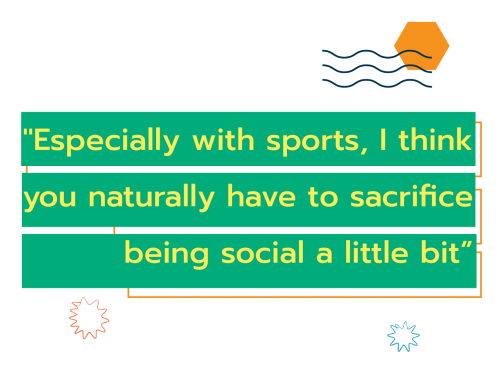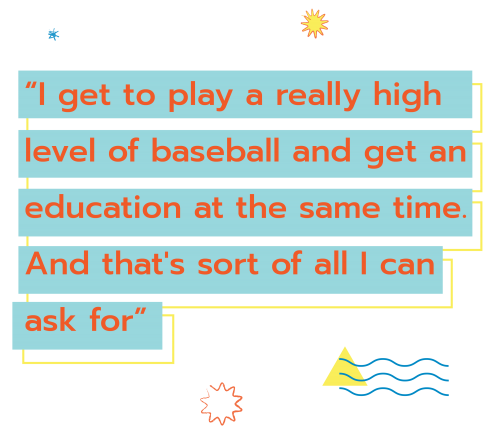Spoiler: It’s all about time management
By Sherina Harris
Illustration by Pernia Jamshed
Jessy Trinh is used to the shocked reactions she gets from classmates when they learn what time she wakes up every morning. During the figure skating season—from September until February—she wakes up at 5:30 in the morning to get to her practices at the Mattamy Athletic Centre by 7:00 a.m.
“They’re like, ‘What? I go to bed at 5:30 [a.m.].’”
Depending on the semester, the third-year interior design student might have class every weekday, on top of having practice four or five days a week.
She is one of many athletes at Ryerson who balances practices, gym sessions, classes, assignments and everything else that comes with being a university student. For all of the memes about that #StudentAthleteGrind, well, we could probably learn a thing or two from student athletes.

The Eyeopener talked to four student athletes at Ryerson about how they’ve found success in the classroom while pursuing their passion on the rink, field or court.
Trinh has been on the rink all her life, and figure skating since she was 11. But coming to university was a big adjustment for her as she went from living in Ottawa with her family, to living alone in Toronto. “First year was very difficult because I had no idea what I was doing, but I had to figure it out on my own,” she said.
The first figure skating competition of the year happens in November, so Trinh finds it most challenging to stay organized around the end of the semester as exams approach.
She credits adhering to set routines for her success in balancing school and athletics. During the skating season, her days follow a similar structure: wake up early and go to practice, come to Ryerson and go to class, stay at school to do work, then go home. She also tries to make time to take care of her mental health by taking a break to Netflix or YouTube, cook dinner, go for a walk or call a friend.
“I typically like to take that break to put myself away from schoolwork, keep my mind off of practices, kind of find other things to de-stress me.”
‘You naturally have to sacrifice’
Life is always going to be chaotic. That’s a message Hayley Robertson, point guard on the Ryerson women’s basketball team and Masters of business administration student, has taken from her years of studying and playing basketball.
Robertson finished her bachelor’s degree in finance at the University of Vermont, where she also played the guard position on Vermont’s basketball team. Like Trinh, she says learning how to balance her time in university was different than in high school.
“You have so much more free time in university or college, because you only have a couple classes a day instead of being in class from like 9 [a.m.] till 3 or 4 [p.m.],” she says.
There are also a lot more basketball practices at the university level, something Robertson initially found draining. She found it helpful to get work done during the daytime, so she could rest at night.
Robertson says she’s learned she can’t do everything and that some parts of life have to be sacrificed. She says she’s found that she’s sacrificed things like going out, but she has a smaller group of friends to hang out with instead—they spend time together studying or getting coffee.
“Especially with sports, I think you naturally have to sacrifice [being] social a little bit, because for the most part, after a long day of classes, and then practice, you’re just tired,” she says.
“I know that school and my family’s first, and my friends, but then academics and then sports—I know those are my priorities. So going out on the weekends, I’m willing to sacrifice that.”
‘Sport teaches you life lessons’
Heidi Beck balanced two sports and academics while she was an early childhood studies student at Ryerson. Though she graduated last year, she’s still balancing her sports—speed skating and curling—with her jobs: outdoor educator at the YMCA and early childhood educator. Her shifts are irregular, so that adds a layer of difficulty to her scheduling.
She acknowledges life is all about balancing, so it’s helpful to have past experience juggling multiple responsibilities.
“I’ve learned that it’s possible to do a lot of different things at the same time,” she says. “I think sport teaches you life lessons that are hard to get in the classroom.”
Beck previously attended Humber College, where she also curled. Throughout her seven years of post-secondary education, Beck sometimes had to miss skating practices to work on class assignments. “It puts you behind, because then you’re not reaching your full potential in your sport,” she says, adding that it’s hard feeling like you’re letting down your team.
“I see sports as a way to kind of destress from school. Because it kind of takes your mind off what [you] have to do tomorrow. It’s like that hour to just decompress.”
Beck says her advice to other busy students, whether they’re involved in athletics or not, is to take time for yourself. “School goes by really fast,” she says.
‘A little bit of a headache’
Like other student athletes, Sam Turcotte, one of the captains of Ryerson’s baseball team, says coming into university was a bit of a shock. Turcotte, a third-year commerce student, says it felt like suddenly all of his tasks were more self-directed; going to class, doing his homework, getting to games, coordinating with teammates.
“After a couple years of it, I’ve definitely gotten used to it, but it can still get really difficult,” Turcotte says.

The baseball season is short, but “action-packed”—training camp starts in mid to late August, and once school starts in September, the team is playing up to four games a week, with two to three practices on top of that. The season stretches from September to the middle to end of October. When the season ends, athletes are expected to be working out three to four times a week, with additional training times.
While the season is shorter than most university sports, its end coincides with the halfway point of the semester; a.k.a., the dreaded overload of midterm exams and assignments.
“A lot of baseball players usually have midterms on or around that tournament weekend—and it’s just nonstop baseball that weekend,” Turcotte says.
He usually has a few assignments due around that time of year, but he’s always been able to reschedule them either before or after the tournament. “But it’s always a little bit of a headache for sure.”
He’s learned that it helps to write down every single due date from course outlines in his calendar so that no assignment deadlines catch him off guard. He also makes daily lists to try to cross quick tasks off the list so he’s not stuck with them in a last-minute rush.
Turcotte says while he’s heard of instances where coaches have to be involved to get professors to accommodate their students, his professors have usually been pretty good at accommodating his baseball schedule when presented with the proper documentation.
Despite the challenges, Turcotte says it’s all been worth it. “I get to play a really high level of baseball and get an education at the same time,” he says. “And that’s sort of all I can ask for.”













Leave a Reply